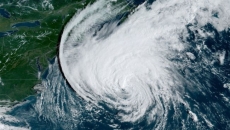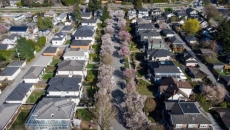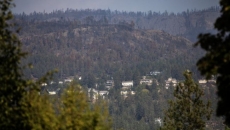The British Columbia government has set out its first set of targets for thousands of new homes to be built in 10 cities or municipalities in an effort to chip away at the provincial housing crisis.
Housing Minister Ravi Kahlon announced Tuesday the communities, located mostly within the Metro Vancouver and Greater Victoria regions, will have five years to deliver on the new housing-unit goals set out in the plan.
We know the housing crisis is hurting people and holding back our economy.
— Ravi Kahlon (@KahlonRav) September 27, 2023
That’s why we’re taking bold action and setting housing targets in the largest and fastest-growing communities.
These targets mark a 38% increase over what was projected to have been created. 🧵 [1/3] pic.twitter.com/SaIXdGw7Wq
Kahlon said the province will assess the progress being made after six months, and an "independent person" may be put in place at municipalities where actions toward increasing housing aren't being taken.
However, Kahlon said he didn't anticipate needing to resort to that step.
“I suspect from my conversations that I've had with all the mayors that are in the first 10 (municipalities) that all of them understand that everyone has to be part of the housing solution,” Kahlon said. “I don't expect that to be a challenge, but the legislation does give us the ability to step in, if needed.”
The plan, if the targets are met, would mean about a 30 per cent increase in overall housing to be built in these 10 communities "compared to what's previously planned," Kahlon said.
The announcement comes as Premier David Eby described the federal government being "pretty clear" that it is not yet ready to share its renewed housing strategy or how it will work with British Columbia's plans to take on the provincial housing crisis.
Kahlon said the housing crisis is so dire in British Columbia that the province is going ahead with its plans without guarantees of federal funding but added that involvement from Ottawa needs to "get into the game in a hurry" because the province “can’t wait much longer.”
“Every day, we're waiting for Canada to make a decision,” Kahlon said. “It's having huge impacts on our communities. We have people living in encampments. We have people living in parks. We have people that are on the verge of losing their homes because of global inflation pressures.”
Among the housing targets being announced are 28,900 units for Vancouver, 7,240 units for Abbotsford, 4,902 units for Victoria and 4,610 units for Saanich. Other municipalities such as Kamloops, Delta, Oak Bay, Port Moody, West Vancouver and North Vancouver District also received housing targets ranging from 664 to 4,236 units in the next five years.
In a written statement, the City of Vancouver said it is pledging “full commitment” to the plan and will “be working diligently to meet or exceed the provincial target” through zoning and permitting changes.
"We have said getting homes built requires an all-hands-on-deck approach, and we are pleased to see clear support from the province to build the homes that we need to tackle the housing crisis head on," said Vancouver Mayor Ken Sim in the statement.
Delta Mayor George Harvie said there is no doubt his city is in need of more housing, but it will only be attainable if it gets help from the province.
"To meet the proposed housing target, the city is requesting the province’s assistance in three key areas: provincial funding, expedited legislative changes to facilitate housing, and refined methodology to measure progress."
Non-profit advocacy group Abundant Housing Vancouver, however, criticized the target number of 28,900 units for Vancouver saying it failed to "reflect the severity" of the shortages seen in the city's housing crisis.
"In the five-year period of 2017-2021, Vancouver added about 27,000 net new homes," said the group's director Owen Brady in a statement. "So, these new targets are unambitious and simply don’t reflect the severity of the housing crisis. They are barely an increase from the status quo."
Brady said previous estimates by the Canada Mortgage and Housing Corporation showed the city would need "at least triple housing production" to address the demand in Vancouver.
British Columbia first broached the plan to set targets for 10 municipalities in May, which Kahlon said would make it easier for local governments to approve projects quickly.
Kahlon said the 10 chosen communities were selected through "an objective, thorough and measured process" that factored in metrics, including projected growth, housing and land availability, affordability, community infrastructure and "unrealized potential in developing more homes."
He said the plan is to select another 10 municipalities by the end of the year to have set housing targets, followed by another 10 municipalities six months after that.
"We wanted to make sure that we did it in smaller numbers," Kahlon said. "Because it was important to have that conversation with the communities to really engage on what the target should be — but also because if we need to step in and communities don't want to be part of the housing solution, a smaller number makes it easier for us to be able to handle the capacity of doing that."
Eby, who has spent two days in Ottawa meeting with federal ministers and Prime Minister Justin Trudeau, said affordable housing would be made available quicker with the co-ordination of all levels of government.
He says the federal ministers were receptive to that pitch.
Eby's trip to Ottawa comes after the federal government announced a $4 billion Housing Accelerator Fund in its 2022 Budget that would provide incentive funding to local governments to encourage initiatives that lead to new housing supply.
"My understanding is the federal government is close to being able to make announcements in terms of the allocation of that funding to support growth in cities, which is very good news," Eby told reporters Tuesday.
"The challenge or the opportunity, I guess, is to co-ordinate that municipal accelerator program with the cities that our housing minister has been working with on housing targets."
The premier said he also made "very good progress" in advancing the interest of B.C. residents in his meetings with the federal ministers, noting he is "particularly happy" with his discussions around how the federal and provincial governments can work together to support the clean energy sector.






